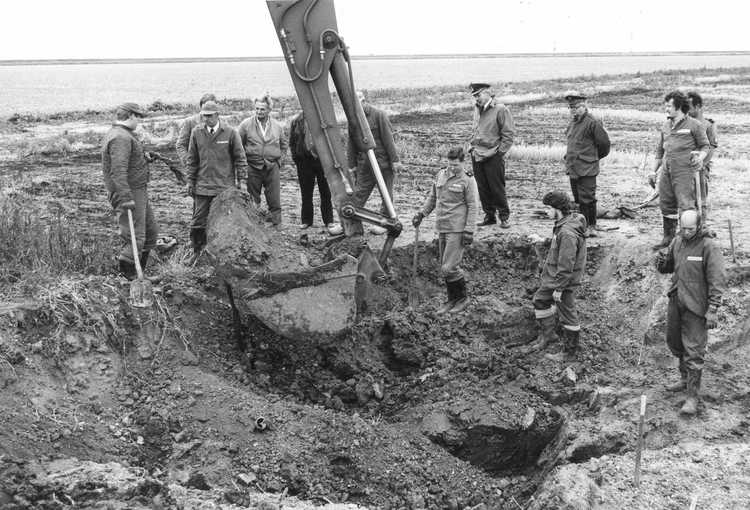The First salvage
I rolled into it automatically. I was a wireless operator with Naval Intelligence. Something completely different and I was working in Amsterdam. In 1962, a plane was salvaged at the Volewijck Park, and of course I went to have a look. The Grave Service and Air Force appeared to be working there together. I had already checked to find out what type, and which aircraft might have crashed there, so I knew this inside information in advance. Then I saw certain pieces that I recognized for this type of aircraft, and so able to put two and two together. As my knowledge was fairly good, this wasn’t too hard. The Air Force then asked me if I wanted to help them, too as I already had files on almost all aircrafts that had crashed in the Netherlands. In 1967 I transferred to the Air Force as a salvage officer.
That switch to the Air Force took five years as at the time of the Cold War, the Secret Service was also an important profession. I was in the Navy as a civilian and stayed that when I went to the Air Force. When in the Air Fore my time in the Navy always was a great help, for if we had lost one of our own aircrafts, which I also had to salvage I often went along with the 'Mineservice' for the search at sea. So I also got some 'sealegs' while going along in a necesssary and very interesting part of of the big job.
Tangible history
It didn’t matter. I could do this very well. It wasn’t a problem for me. As a interception wireless operator you were constantly turning the tuning. Listening, listening, listening. To another part of the world. You could concentrate well and I didn’t mind browsing through books and ancient history. Not everyone can do that. It just wouldn’t work. We bring the men back home. These men are missing in action. They gave their lives for us and I could give something back. It feels good to do something in return. I could handle it even so it was still quite emotional every now and then. What I had to do, and what I always tried to do, was to reconstruct what had happened. Only then could you prepare yourself for what you might find there. At the time of the salvage, I was the only one who knew the identity of the aircraft. We didn’t talk about it. I had a good team that wasn’t the problem but you couldn’t talk about it as I felt if you found some human remains you had to be 200% certain before talking about it. You certainly shouldn’t talk about it until after the funeral once everyone had been informed. After everything had been officially completed.
Human remains
When after so many years you find the remains of someone, you take a moment. You know this will happen. The graveservice team puts the remains in a row, I put the bits and pieces from the aircraft in a row. If you find an aircraft with four or five people, you have to figure out who is who. We all have a skeleton but all skeletons are different. Just like DNA but that wasn’t available then. So they checked the skeletons. I always made sure that the graveservice team had all the necessary papers, then they could say: this is …. And this is …. I t was only later that all was sent to the embassies, and they made sure it was known on the other side. It’s wasn’t always just the skeleton that remained after all those years. That depended on the type of soil. If it was peat you found more. Once it was pulled out of the ground it quickly disappeared. I once salvaged an American P-38 fighter at Hoogeveen and there was more than just a skeleton. In the polder you only found 'clean' bones. If we did find human remains, it was to some extent reassuring: we weren’t doing it all for nothing. The reason for everything became clear again. It gave us courage to continue. You got used to it a little bit but never entirely.
Motivation
I was an outsider. You rolled into this profession because you had such an interest, you could do it. The salvaging wasn’t easy, even so. Being able to identify people was the motivation. If your wife wasn’t behind you, it was impossible to do. Of course my wife never went to a salvage but years ago an aircraft was salvaged in our neighbourhood and my successor asked if we wanted to come and have a look. That time she went with me. The first time she came, she sniffed and said: that’s how you smelt when you came home. It was a mixed smell of oil, gasoline and ground. You couldn’t help but smell it.
